- Home
- Tony Hillerman
The Wailing Wind Page 9
The Wailing Wind Read online
Page 9
“And there was some talk that I’d killed her,” Denton said. “And hid the body. I was supposed to think she was in cahoots with McKay and I was jealous.”
“That would be my first question,” Leaphorn said. “Did you kill her?”
“No,” Denton said. “Hell no, I didn’t.”
“Have you heard anything at all from her, or about her for that matter, since she left here that morning?”
“Nothing at all from Linda. Got some calls and some letters after I ran those advertisements. None of them had anything to tell. Just people trying to get some reward money.”
“Calls? How? Your telephone number’s not listed.”
“I had another phone line put in. Put the number of that one in the advertisements. Had a technical man come to hook up an answering machine recorder on it. I’ve got the tapes if you think listening to any of those creepy bastards would help.”
“It might. You saved the letters, too?”
“In a file.”
“How did Doherty get your unlisted number?”
“Doherty? What do you mean?”
“He had it,” Leaphorn said. “Had he called you?”
“He didn’t get it from me, and no, he hadn’t called me. I bet that’s why the FBI has been asking around about me.”
“That, and all the stuff about gold mining he had with him. I’d guess they think there might be a connection with the McKay homicide and his.”
That didn’t seem to surprise Denton. He nodded.
“Okay,” Leaphorn said. “Now I want you to describe that day for me. Everything pertinent. I know you told it all to the police then, but give it to me again now that you’ve had some years to think about it.”
Denton did as instructed. The discussion at breakfast of what to do about the ground squirrels looting Linda’s bird feeders, Linda’s anticipation of her luncheon meeting with girlfriends—one of whom she thought was going to announce being pregnant. Linda planning to stop at the shopping mall enroute to look at possible presents. Linda leaving, saying she’d be back about three. Denton spending the morning in his office, not getting any work done because he was excited about the information McKay was to bring him—a map showing the whereabouts of the Golden Calf and the evidence to prove it was all authentic.
At that point Leaphorn stopped him.
“Evidence? Like what?”
“He said he’d bring a pouch of placer gold, copies of old letters from Theodore Mott to his lawyer up in Denver. He said they described the site—and its location from Fort Wingate—in great detail. And another copy of a letter from an assayer describing thirteen ounces Mott had brought in, and a copy of the assay report. And then he said he’d have some other stuff.”
“Like what?”
Denton laughed. “Well, for one thing, a copy of a contract I was supposed to sign guaranteeing him fifty percent of all proceeds from the mine. And a bunch of photographs of him placering the gold he was bringing.”
Leaphorn nodded.
“I was to seal the deal with delivery of fifty thousand dollars in cash, and he’d give me a partnership contract he’d signed to a claim he said he’d already filed.”
“That was all agreed to before?”
“Right. On the telephone. Two days before. That was a Monday. He said he needed to collect the stuff and he’d be out here right after noon on Wednesday to close on the arrangement. And after we’d made the deal and shook hands on it, he’d drive me out and show me the place.”
“But you didn’t go,” said Leaphorn.
“Of course not. I shot the son of a bitch and went to prison instead,” Denton said. He produced a grim smile and continued his account.
McKay had called about 2:00 P.M., said he was running a little late and he’d arrive about 6:00. He’d asked if Denton had the money there, and Denton said he had five hundred one-hundred-dollar bills in a briefcase ready to be paid in return for the map and the evidence. A little after 6:00 McKay had called in from the driveway gate, Denton had pushed the opener button, and Mrs. Mendoza had answered the front door and brought McKay to the office. McKay had laid a briefcase on the table and asked to see the money. Denton had got his own case, opened it, and showed McKay the bundles of bills he had gotten at the bank. McKay dumped them out, inspected the bundles, and put them back into the case. Then he opened the padlock on his own case and took out a map and other papers.
Denton stopped, shook his head. “Bunch of damned trash,” he said. “I don’t know what had gotten into me to have believed that bastard. I guess it was too many years wanting so bad to find that mine I was ready to believe anything. I just felt sick when I looked at the stuff.” He shook his head again. “Sick to my stomach.”
Leaphorn hadn’t been there when Denton had gone before the judge to plead and receive his sentence. But he’d heard about it from a half dozen friends who had. This seemed to be the same story Denton had told the court when his lawyer was urging clemency. It had the rehearsed sound Leaphorn had listened to at all too many criminal trials.
“Bad map?” Leaphorn asked.
“It was a section of one of those U.S. Geological Survey quadrangle maps. It covered a piece of the south and east side of the Zuñi Mountains. He just drew his own set of marks on that.”
“You think that’s not a likely place to look for gold? But isn’t that about where that half-Zuñi told you the placer gold came from?”
“Same general area, I’d guess. But hell, you can find gold anywhere. Even in ocean water. It just happens that I personally know that little corner of the Zuñi Mountains. Most of the land he had marked out is BLM or Forest Service. Public land. Years ago, I did a lot of seismograph work right where that map covered, thinking I might want to lease it for oil and gas. I’ve been up and down every little creek and arroyo in that whole quadrant. I didn’t get any seismograph results that made me want to drill, and I didn’t see any of the quartzite formations you’re trying to find when you’re prospecting for gold.”
“You didn’t trip over any nuggets,” Leaphorn said, and immediately wished he hadn’t. It came out sounding sarcastic, and he didn’t want Denton to think he wasn’t taking this account seriously.
Denton hadn’t noticed.
“Wrong kind of deposit for nuggets,” he said. “Some big chunks were brought in and assayed from the Lost Adams dig and the Dutchman mine, too, but from what we know about the Golden Calf, the source there must have been just quartzite with a fantastically rich mix of gold veins through it. When quartz breaks up and weathers away, the gold just comes off in teeny little flakes.” Denton made a dismissive gesture. “So soon as I saw McKay’s map, I knew damn well it was a phony.”
The memory of this disappointment stopped Denton. He drank his cold coffee. Put down the cup, gave Leaphorn a wry look.
“The rest of his so-called evidence was photocopies. Looked like he’d had some letterheads printed to make stuff look authentic, and the name right. I’ve been studying this stuff for years, and I know all those names. But, hell, I could have put together a better package myself. Anybody could have done it.”
He looked at Leaphorn, at his hands, and at Leaphorn again, and then just sat, saying nothing, looking old, defeated, and exhausted.
“What next? You tell him no deal?”
“I told him to go to hell. Get out of my house and take his garbage with him. And he accused me of being a welcher. Said he’d given me his location of the Golden Calf and he wasn’t leaving without me signing his contract and him walking off with the fifty grand. Well, we exchanged a word or two, and he pulled that pistol out of his jacket pocket and was going to shoot me. So I said to hell with it. I’d sign the paper, he should just take the money and get out. I reached in my desk drawer like I was getting my pen, and got my pistol out and shot him. I don’t usually keep a gun in here, but with all that cash in the house, it seemed like a pretty good idea.”
Another long pause with Denton either remembering the momen
t or, Leaphorn thought, perhaps deciding what else to tell and what to leave out. Denton shook his head.
“I yelled for Mrs. Mendoza to come, but she’d heard the shot and was already on her way. I checked to see if McKay was dead. She called nine one one and reported it. The ambulance came, and the sheriff’s deputies. And that was pretty well it.”
Denton stood, looking down at Leaphorn. “Well, what do you think? You going to give me some help?”
“We need to fill in some blanks before I decide. I want you to answer some questions.”
“Like what?”
“Like where was your wife while all this was happening? She said she was coming home after lunch.”
“I don’t know where she was. I thought she might have stopped off to do some shopping, but usually she told me if she was doing that.”
“Did she take anything with her? A big handbag, anything that would hold stuff if she was going to be gone for, ah, say, overnight?”
Denton drew in a long breath. “That was the last time I saw Linda,” he said, “and I’ve been over it many a time. It was a sort of chilly, breezy day, and she had on a tweed-looking skirt, and a jacket, and was carrying her little purse and one of those little radio tape players. I gave it to her for her birthday. What do they call them? They have headphones so you can listen to music or whatever while you’re walking.”
“Just carrying a regular purse?”
“That’s all.”
“She was driving herself?”
“Yeah. She had a little Honda. Same one she was driving when we got married. When they had me in jail waiting the court hearing, I called Mrs. Mendoza or George Billie every day to see if they’d heard from Linda, and George said her Honda had turned up in the parking lot at the mall. He got someone to drive it back to the house.”
“Nothing in it?”
Denton shrugged. “Just the regular stuff. Road maps in the side pocket, sunglasses, package of tissues, usual stuff.” He made a wry face. “I asked George about that little radio tape player. Thought he might have got off with it, to tell the truth. A very pricey little gadget. I saw it advertised in one of those airline shopping-mall magazines. Think it was Cutting Edge, or Sharper Edge. Something like. Very high tech. Played disks as well as tape. Linda was into disks. Loved music.”
“George didn’t steal it?”
“He said he didn’t. Got pissed off when I asked him. Said Linda wouldn’t have taken it along with her if she didn’t intend to listen to it. Good point, I guess. In the car she had the car radio, but it didn’t play her disks.”
“It hasn’t turned up anywhere?”
“I had the pawn shops checked,” Denton said. “Nothing.”
“You said McKay called you. Said he’d be late. You’re not listed in the telephone book, and I’ve been told you never give anybody your telephone number.”
“He’d gotten it from Linda.”
That produced a long silence.
“When? That day?”
“No. No.” Denton said. “When they first got acquainted down at the café. I guess you’ve heard how friendly she was with everybody when she was working down there.” He produced a humorless laugh. “Including me. Anyway, she heard him talking about prospecting and the hunt for old gold digs, and she told him about me being interested in that. And he said he’d like to compare notes with me, and she said why didn’t he call me about it.”
“Is that your only number?”
“It used to be. But after I was in jail and found out she hadn’t come home and started running those advertisements asking her to call, I put in the other line.” Denton pointed. “It’s that phone on the little desk over there.”
“Was anyone with McKay when he got here?”
“Just him.”
“No one came in the car with him?”
Denton stared at Leaphorn.
“I didn’t see him drive up. He pushed the button at the gate, and I pushed the button in here to open it. Then Mrs. Mendoza let him in when he rang the bell.”
Denton turned and yelled down the hall: “Gloria, can you bring us another round of coffee?” He faced Leaphorn again, frowning. “What are you getting at? You think he had a partner?”
“You sure he didn’t?”
“Well, no. Not sure. No way to be certain. But why would he? Are you thinking Linda might have worked with him?”
“McKay had been out at Fort Wingate that afternoon. He had a woman in the car with him.”
Denton looked startled. “Who? Where’d you hear that?”
“The clerk in the records office just got a glimpse of her. When she suggested McKay bring her in, he said it was his wife, and she was sleeping.”
“You think it was Linda?”
“I have no idea who it was,” Leaphorn said. “I’m just asking questions. Working a jigsaw puzzle with some missing pieces. Linda originally met McKay at the café? That right? He talked to her about gold-mine legends. She told him about your interests and gave him your number. So Linda sort of got the two of you together. Didn’t you have any suspicions about that?”
“Never. Absolutely damned never.”
“Those days after the shooting, when you were wondering what happened to her, it would have been natural to think about that when you were—“
“No sir,” said Denton. “It wouldn’t have been natural. Not for me, it wouldn’t have been. I knew her. She loved me. Anything she would have done, it would have been because she thought it would help me.”
“And that time in prison. Not a call. Not a postcard. Nothing. It’s hard to believe—“
“Mr. Leaphorn,” Denton said, his voice strained. He walked to the wall of windows and stood looking out. “You ever loved anybody?” he asked. “People talk about people, and you got to be sort of legendary, and so you got talked about a lot. They said you really loved your wife.”
“I did.”
“Well, maybe you can understand this, then. If I can figure out how to tell you.”
It proved to be a long story. Denton described himself as an old bachelor, the only child of a preacher who moved too often to give a boy a chance to make friends even if he’d been good at making them. Being bashful, being homely, he’d never really had a girlfriend—at least not the kind you’d want to have much to do with. By the time he had gotten lucky in the lease-buying business, he’d written himself off as a lifelong bachelor. He said when he saw Linda waiting tables at the café where he often lunched, he was solidly set in his loner ways. But she was beautiful and kind and friendly, and she never seemed to notice he was homely, and they gradually got acquainted. It turned out she’d lived in Wyoming before her family moved to New Mexico, and one snowy day when nobody was eating lunch there, she told him about once getting snowbound at their place near Cody, and he told her about spending two days trying to keep from freezing in his stuck pickup truck out on a drilling lease.
“I don’t know how the hell it ever happened,” Denton said, “but we got to be really friends. She’d ask me questions and get me talking about trying to get a wildcat well drilled, and the bad guesses I’d made, and the thrill of seeing a big well come in up in the Texas Panhandle when I was flat broke. All that sort of stuff. She was going to school part-time then at the University of New Mexico branch here, and having trouble with a geology course. I helped her with that, and before long it dawned on me. Crazy as it was, I was in love with her.”
Denton paused and repeated that. “Crazy as it was. Me old enough to be her daddy, and I was in love with her. And I never got over it and I never will.” He turned to look at Leaphorn. “Can you understand that?”
“Perfectly,” Leaphorn said. He had never gotten over being in love with Emma—not with her being dead all these years. And he never would.
“Then I’ll tell you something that’s even harder to understand. It turned out it was mutual. She loved me, too. Can you believe that?”
“How did you know?”
“All s
orts of little things,” Denton said. He thought about it, nodded, and decided to explain.
“You might think I’m pretty easy to fool, letting this McKay thing go as far as I did. But that wasn’t normal. It was because I want that Golden Calf so damn bad, and I was getting so frustrated with hunting it, I just quit thinking. But you don’t make money in the mineral lease racket without being skeptical, and if you ain’t to start with, you get that way damn quick. You leave your trust at home in the closet. Your basic idea is that everybody is out to skin you, and so you’re always looking and listening for a sign of it. You ever gamble?”
“All Navajos gamble,” Leaphorn said. “But I’ve never done much of it.”
“Gamblers call it ‘looking for tells.’ Little things that another gambler might do that tip you off. Well . . .” Denton waved at their surroundings. “You can see by this I was good at reading tells. And when the money started coming in, and people could see it was, then I got to practice on another bunch. People who wanted to get to me and get some of it.”
“And you thought Linda was one of those.”
“Of course I did. Wouldn’t you if you looked like me? So I was watching everything she said or did. And finally . . .” He stopped. Threw up his hands. “What can I tell you to make you believe it? I couldn’t believe it myself, but I finally had to admit it. Crazy, but she loved me. So I asked her why. Me being way too old and ugly. And she said . . .” Denton looked away from Leaphorn, embarrassed by this. “She said it was because of what I’d done. How I’d lived. What I’d gone through. She said she thought I was a real strong man and the men she’d been around before were really just boys. Can you understand that kind of thinking?”
“Sure,” Leaphorn said. “But do you want me to believe that, after what happened with McKay, after she dropped out of sight, you didn’t have your doubts?”
“Never. Not a single—“ And then he stopped, closed his eyes. “Of course I did,” he said. “Sitting in the jail there that night after they arrested me. And she didn’t call. And hadn’t come home. And my lawyer couldn’t locate her. If I could have thought of a way to do it, I would have killed myself.”

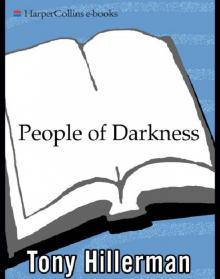 People of Darkness
People of Darkness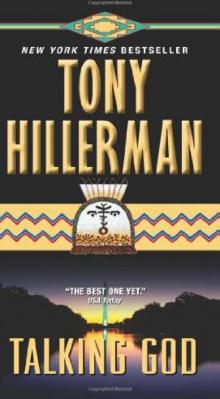 Talking God jlajc-9
Talking God jlajc-9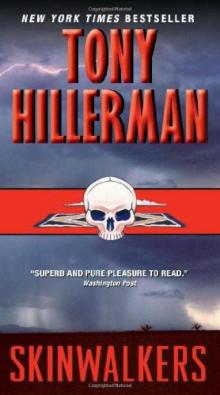 Skinwalkers jlajc-7
Skinwalkers jlajc-7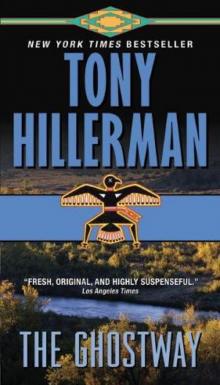 The Ghostway jlajc-6
The Ghostway jlajc-6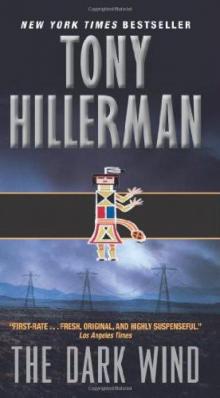 The Dark Wind jlajc-5
The Dark Wind jlajc-5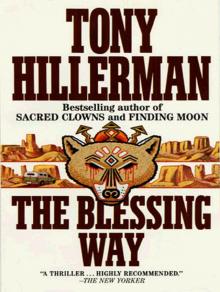 The Blessing Way
The Blessing Way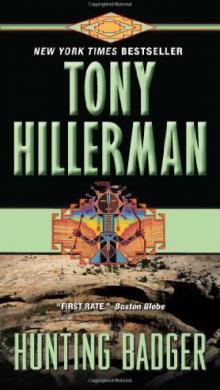 Hunting Badger jlajc-14
Hunting Badger jlajc-14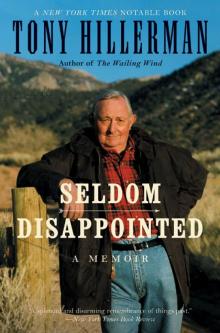 Seldom Disappointed: A Memoir
Seldom Disappointed: A Memoir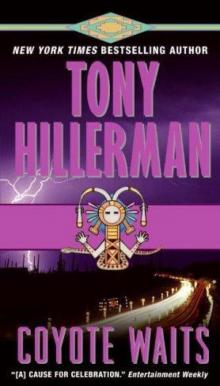 Coyote Waits jlajc-10
Coyote Waits jlajc-10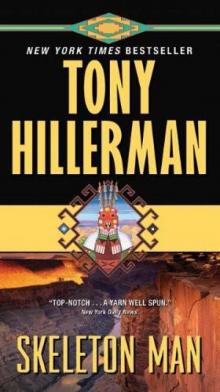 Skeleton Man jlajc-17
Skeleton Man jlajc-17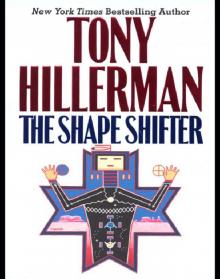 The Shape Shifter
The Shape Shifter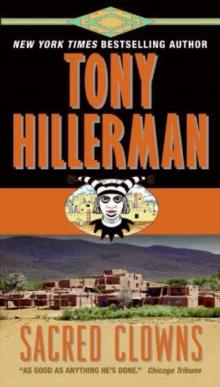 Sacred Clowns jlajc-11
Sacred Clowns jlajc-11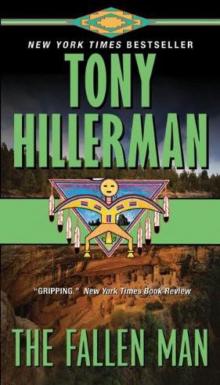 The Fallen Man jlajc-12
The Fallen Man jlajc-12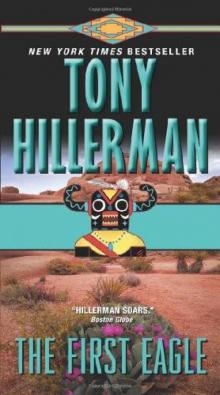 The First Eagle jlajc-13
The First Eagle jlajc-13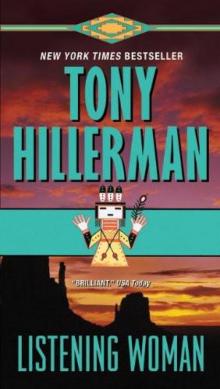 Listening Woman jlajc-3
Listening Woman jlajc-3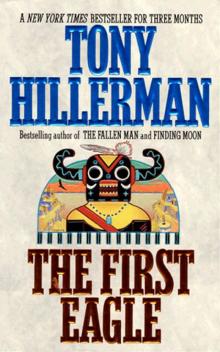 The First Eagle
The First Eagle Skeleton Man
Skeleton Man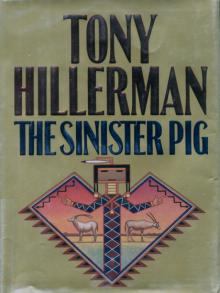 The Sinister Pig jlajc-16
The Sinister Pig jlajc-16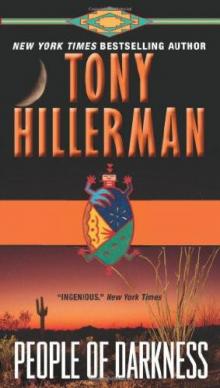 People of Darkness jlajc-4
People of Darkness jlajc-4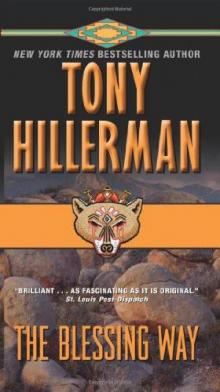 The Blessing Way jlajc-1
The Blessing Way jlajc-1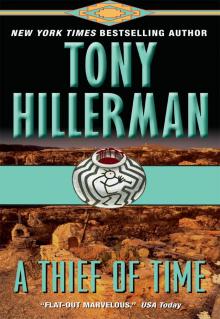 A Thief of Time
A Thief of Time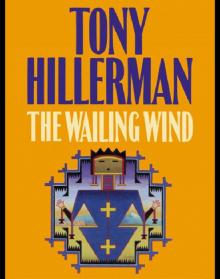 The Wailing Wind
The Wailing Wind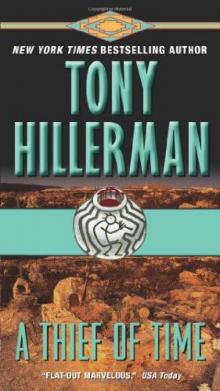 A Thief of Time jlajc-8
A Thief of Time jlajc-8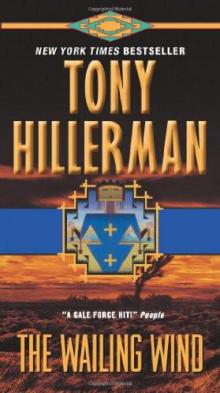 The Wailing Wind jlajc-15
The Wailing Wind jlajc-15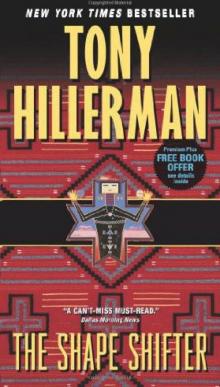 The Shape Shifter jlajc-18
The Shape Shifter jlajc-18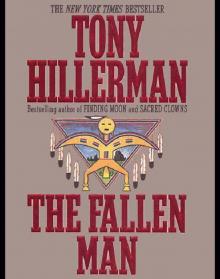 The Fallen Man
The Fallen Man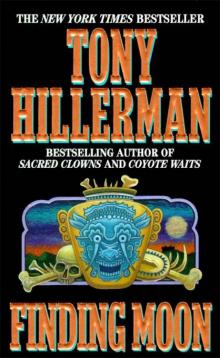 Finding Moon
Finding Moon